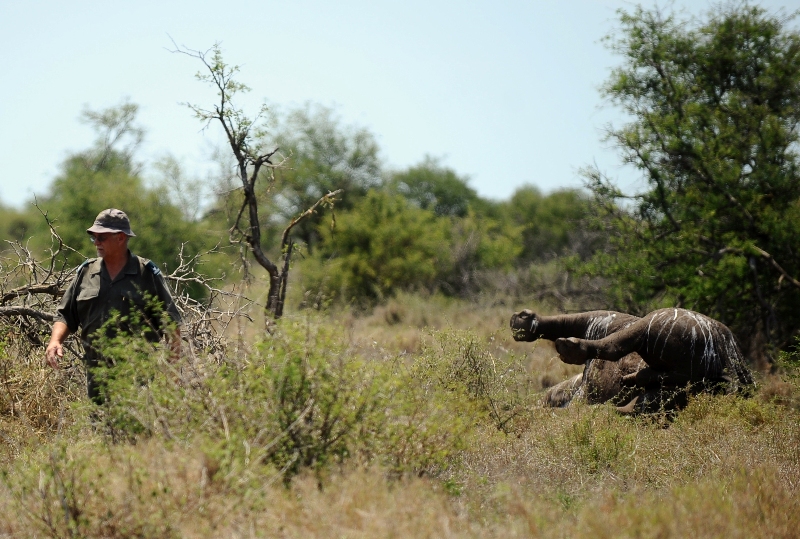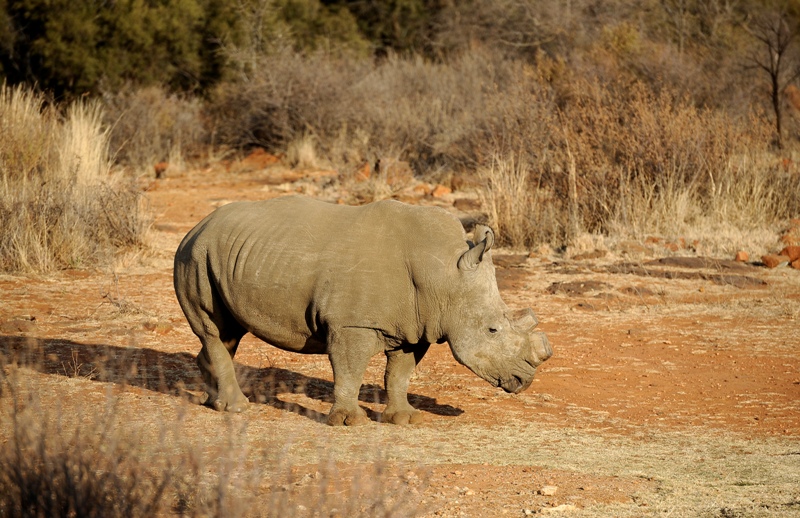Poachers are devastating one of the largest rhino populations in the world.

Thirty of the protected animals have been reportedly killed in South Africa in the past two weeks alone, their bodies found decaying with the horns removed.
The disturbing news comes on the heels of a Dec. 19 report by South Africa’s environment ministry that found 946 rhinos were killed last year – one of the worst years on record.
“It’s been a rate of almost three a day,” says Ernie Cooper, Director of TRAFFIC and Wildlife Trade for the World Wildlife Federation-Canada. “We expect the final report on the number of rhinos killed to be released soon. We have our fingers crossed that it doesn’t reach 1,000.”
READ MORE: Permit to hunt endangered African black rhino sells at Dallas auction
According to the South African National Parks agency, 13 rhinos were killed in 2007, which exploded to 946 in 2013.
South Africa is home to the largest population of rhinos in the world thanks to successful conservation efforts. But a recent increase in demand for the coveted rhino horn – which can fetch $100,000 to $300,000 on the black market – has seen the number of rhinos killed in the area skyrocket.
The rhino horn has been used in the past as a treatment for disease in Chinese medicine, and has more recently become a status symbol of the upper class in Vietnam as a kind of cure-all remedy. Cooper says the demand for rhino horn is growing in the emerging economy of Vietnam as the middle class expands and residents have more disposable income.
The sharp increase of rhinos being killed since 2007 also coincided with a rumour that rhino horn had cured cancer in a unnamed Vietnamese politician.
The current approach to stopping the rhino slaughter involves three steps and the co-ordination of several government agencies in multiple countries.
“One is to stop the poaching, combat the illegal activity on the ground in South Africa. The second is to kill the demand in other countries, which is right now primarily in Vietnam. The other is to stop the transport of rhino horns in neighbouring countries like Mozambique,” Cooper said.
The rapid increase in the demand for the horn has led some conservationists to propose more radical ideas for saving Africa’s rhinos.
Duan Biggs, who grew up in Kruger Park in South Africa and is now a post-doctoral fellow with the University of Queensland in Australia, says legalizing the horn could be the solution to halting the illegal horn trade.
- Invasive strep: ‘Don’t wait’ to seek care, N.S. woman warns on long road to recovery
- Ontario First Nation declares state of emergency amid skyrocketing benzene levels
- Do Canadians have an appetite for electric vehicles? Experts are divided
- Nearly 200 fossil fuel, chemical lobbyists to join plastic treaty talks in Ottawa
One of the underlying reasons behind legalizing the horn trade is a rhino’s horn grows back if it’s harvested properly.
“From one rhino you can get around 8 horns during its lifetime,” Biggs said. “Right now under the trade ban people are killing the rhino and getting one horn per rhino.”
Biggs has been advocating for a system that would allow African farmers to raise rhinos on private farms, periodically cutting the horns for sale overseas.
“If you set up a carefully regulated, legal trade, that money could go towards protecting rhino and their habitats. It would create jobs in poor marginalized rural areas for people,” he says.
Legalizing the horn trade would also help reduce high prices for the horn seen in countries such as Vietnam.
But Biggs says this approach has often been ignored as rhino conservation policy has been dominated by organizations and people who believe in continuing to enforce the trade ban, which he says is failing.
As conservationists continue to work to preserve rhino populations they agree that if the status quo continues the rhinoceros could become extinct in the coming decades.
“There was a time when the rhino was a common animal in Africa and now they are on the brink of extinction purely due to poaching. And if we allow this species to disappear what does that say about our ability to preserve any species?” Cooper said. “This could happen to any species in any country. What we learn about preserving rhinos in South Africa we can use to help preserve other species around the world.”





Comments